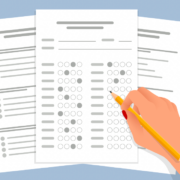How to Prepare for the Bar Exam During 3L Year of Law School
How to Prepare for the Bar Exam During 3L Year of Law School
After two or more grueling years of law school, you’ve made it to the fall semester of your final year. Time to kick your feet up and relax, right? Yes and No. It is definitely important to exhale a bit and reflect on how far you’ve come. At the same time, it’s a great time to start considering all that comes after graduation. For most law students, that includes preparing for the bar exam. Even if you don’t want to dive into studying just yet, there are several steps you can take this year to ensure you’ll have success during test time. Below, we talk about how to prepare for the bar exam during your 3L year of law school.
How to Prepare for the Bar Exam During 3L Year of Law School
Handle the Easy Stuff Now
1. Select a Bar Course
One of my earliest memories of law school is seeing bar course campus representatives trying to convince students to try their product with bribes of bagels, coffee, and cookies. As a 1L, you probably focused more on the freebie than the product. Now that you’ve reached your 3L year, however, you have an important decision to make: of the many viable bar prep options, you’ll need to determine which works best for you.
Start asking questions as early as possible. You’ll of course want to ask these representatives about pricing and pass rates. Beyond that, it’s worthwhile to connect with any former students who have been through the study process already. This kind of perspective is useful to know before you shell out thousands of dollars for a prep course. By applying the wisdom of those who came before, you can avoid potential pitfalls. Still considering your options? Check out J.D. Advising’s Bar Prep Course for pricing and reviews from former students.
2. Study for and Take the MPRE
Most states require that you take the MPRE before you can be admitted to practice. If you’re planning to work in one of those states, consider taking the test as early as possible in your 3L year if you haven’t taken it already. There are several reasons for this. First, you want to give yourself multiple opportunities to take the test in case you are unsuccessful the first time. Second, by getting this hurdle out of the way early, you’ll save yourself from having to juggle studying for the MPRE with all the other to-dos that come toward the end of your law school career. If you still have questions about the MPRE timeline, check out When Should I Sit For The MPRE?
Even if you don’t anticipate needing an MPRE score in order to practice, consider taking the test anyway. You never know where life will take you, and it would be a major drag to have to sit for the test when you have already started your career. Additionally, preparing for the MPRE helps you understand how you might prepare for the bar. Take this as an opportunity to see where, when, and how you study best. Having these strategies in place now will provide an advantage when it comes time to study for the big one.
As most bar prep courses will offer an MPRE study course for free, you’ll get the chance to test drive a service before making any major commitments. Many bar prep programs are set up similarly to their MPRE coures, so you can also get a feel for how a bar exam course is structured. Not sure which company to go with? Consider JD Advising’s free MPRE course.
While You’re Handling the Easy Stuff, Try to Address Some Hard Stuff Too.
Bar exam prep is not well suited to the demands of regular life. You’re faced with several monumental life decisions arriving right at the end of your law school career. For example, you’ll likely be starting a job shortly after school ends. Some employers are fine with you waiting until the fall to begin work, but not all. It is entirely possible your new bosses expect you to complete an orientation and basic introductory tasks immediately after graduation. Similarly, you may be relocating to a new city or state after school ends. If that’s the case, you’ll obviously need to tour new living accommodations, move, and settle into your new life. Start mapping out the next steps now so you can determine what effort you can devote to studying well in advance.
If you’ve got flexibility when everything gets started, figure out your budget for the study period and decide whether you can manage an extended period of time off of work. If not, start studying earlier to avoid having to work full days followed by multiple hours of studying. You can create sustainability in whatever circumstances your face by planning ahead.
It’s also time to have yet another one of those “I’m going to be busy” conversations with friends/family/significant others. As was the case during 1L exams, you’ll be spending most of your waking hours during bar prep studying. Have straightforward conversations with loved ones early so they know your graduation day is just the start of another intense process that will consume most of your time. Be sure to also explain how your loved ones can help you throughout this process! Having someone who is ready to meet up for coffee, chat over the phone, or even help with housework or child care can make studying for the bar exam just a little bit easier!
Finish as Much of Your Bar Exam Application as Possible
1. Complete All Necessary Forms and Gather Any Requested Material
Most states seem to require you to submit a tree’s worth of paperwork for admission. You’ll need to supply not only academic information, but also a list of your previous addresses and jobs, references, driving history, and other highly-specific bits of information. As you might expect, gathering all this information takes time. Don’t be that person who couldn’t even take the bar exam because they blew the application deadline. No later than the fall of your final year, research your state’s requirements and get started gathering materials and info. The earlier you start, the less stressed you’ll be by the time spring rolls around.
2. Check if there are any Unique Admission Requirements in Your State
Some states require that applicants complete additional steps to gain admission. For example, New York state requires that you provide 50 hours of pro bono service. If you dream of practicing in New York, save yourself some drama and spread those hours over a few months. If you want to work elsewhere, be sure to check whether there are any other extra steps to admission. That way, you’ll save yourself from completing these requirements simultaneously with bar preparation or (gulp!) missing your chance for admission altogether.
On the opposite side of the spectrum, there may be some hassles you can avoid. For example, Connecticut and New Jersey allow applicants to forgo the MPRE if they pass an ethics course during law school. Regardless of where you want to work, knowing your state’s requirements ahead of time can help take something off your plate if you find yourself scrambling down the stretch.
Weave Bar Prep Into Law School Daily Life
1. Take Any and All Bar Prep Courses Offered by Your School
When I was a 3L, my law school offered a semester-long course covering the MEE. The class wasn’t topic-based, but rather taught me how to frame answers and use time as efficiently as possible to produce my best work regardless of what was being asked. The class gave me the opportunity to start slow and make lots of mistakes in a relatively low-pressure environment setting. When I had questions or doubts about my progress, the instructor was available during office hours to offer advice. By the time I started studying in earnest, I had already worked through dozens of practice essays. This trial and error process gave me the necessary skills to produce solid answers when test time came.
Your school may require that you take a prep course. If so, give it your best effort and make it a priority. If your school gives you an option, consider whether an early start in a structured classroom environment may help to make bar preparation a little bit easier.
2. Take Advantage of Any Programming Put On by You Law School
In addition to formal classes, many schools offer non-credit programming to help students understand the bar exam essentials. These opportunities come in a variety of forms, from info sessions and introductory planning meetings to boot camps and Saturday morning/winter break prep sessions. Make the time in your schedule to take full advantage of anything that is made available by your school. Come prepared and ask questions about any aspect of the process that remains unclear. Bar preparation becomes a rather solitary experience once you’ve finished classes. It’ll be tougher to reach those who can answer your questions or walk you through things. Take advantage of your school’s resources and get comfortable with the process now before you’re off on your own.
3. Consider the Merits of “Bar Subject” Classes
Ask one hundred law students their strategy for taking “bar” classes (i.e. classes that cover material also found on the bar exam) and you’ll likely get one hundred different answers. Some insist on taking a class on every subject encountered on the bar exam. Others take a smattering based on their availability and interest. Some do not make these classes a priority at all. As with everything else in law school and life, you need to choose the path that’s right for you.
Bar prep courses are designed to allow complete beginners to learn the basics of a topic and build up a knowledge base sufficient enough to crank out an essay or answer a few multiple-choice questions. If you miss a class, you’re by no means destined to have trouble on the exam. With that said, some courses, such as Evidence and Criminal Procedure cover content that many students find tricky and can be found on the MBE and MEE. Additionally, evidence has a bunch of rules to memorize, and they are not always intuitive! Consider prioritizing taking these courses to give yourself more time with the subject matter without the pressure of an impending test. By the time bar prep arrives, you’ll be familiar with terms and concepts and can breeze through the preliminary material.
Additionally, consider taking a professional responsibility or ethics course (if it’s not already required). This class will give you a working understanding of the Model Rules of Professional Conduct, which will help immensely when it’s time for MPRE preparation. Consider taking this class the semester before you plan to take the MPRE to ensure you get the maximum benefit.
Shift Your Priorities, Let Go of Extra Baggage, and Pace Yourself
Chances are, you’ve spent the first years of your law school career pushing yourself. You’ve loaded your schedule with a variety of internships, club and journal participation, competitions, and classwork while relying on school breaks to rest and recover from semester stress. Even if you’ve found this formula sustainable previously, consider how things will be different in your final year. There’s will be no break this time around. You’ll be moving straight from finals and graduation directly into studying.
As a general rule, think of your final year as the time to transition from building your resume to prioritizing what comes next. If you can afford to take fewer credits or drop a peripheral commitment, consider doing it. No resume in the world will save you if you don’t get the score needed for practice. You owe it to yourself to ensure you are as fresh as possible when test time comes around.
Evaluate Whether Starting Your Prep Course Early Will Work For You
The “right” time to begin prep is different for everyone. At some point during your winter break, sit for a quiet few minutes and have an honest conversation with yourself. What does your workload look like in the coming semester? How many of those traditional “bar” classes have you taken? Of the classes you have taken, how well did you do and how well do you remember the material? Is the added weight of early bar prep more likely to stress you out or help soothe your fear of the unknown?
You’ve made it this far in school and know yourself better than anyone else could. Choose the journey that will work for you. If you’re still unsure whether to start early, check out Should I Start Studying for the Bar Exam Early?
It can be a challenge deciding how to begin your bar preparation. By taking the these steps during your final year, you can ensure you are as prepared as possible for the exam without burning yourself out in the process.
Looking to Pass the Bar Exam?
Free Resources:
- 🌟Bar Exam Free Resource Center: Access our most popular free guides, webinars, and resources to set you on the path to success.
- Free Bar Exam Guides: Expert advice on the MBE, the MEE, passing strategies, and overcoming failure.
- Free Webinars: Get insight from top bar exam experts to ace your preparation.
Paid Resources:
- 🏆One-Sheets: Our most popular product! Master the Bar Exam with these five-star rated essentials.
- Bar Exam Outlines: Our comprehensive and condensed bar exam outlines present key information in an organized, easy-to-digest layout.
- Exclusive Mastery Classes: Dive deep into highly tested areas of the MBE, MEE, MPT, and CA bar exams in these live, one-time events.
- Specialized Private Tutoring: With years of experience under our belt, our experts provide personalized guidance to ensure you excel.
- Bar Exam Courses: On Demand and Premium options tailored to your needs.
- Bar Exam Crash Course + Mini Outlines: A great review of the topics you need to know!
🔥 NEW! Check out our Repeat Taker Bar Exam Course and our new premier Guarantee Pass Program!











Leave a Reply
Want to join the discussion?Feel free to contribute!